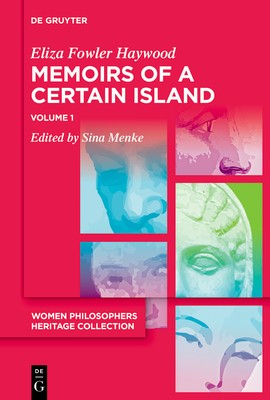
- We will send in 10–14 business days.
- Author: Eliza Fowler Haywood
- Publisher: De Gruyter
- ISBN-10: 3111149501
- ISBN-13: 9783111149509
- Format: 15.6 x 23.4 x 1.4 cm, minkšti viršeliai
- Language: English
- SAVE -10% with code: EXTRA
Memoirs of a Certain Island Adjacent to the Kingdom of Utopia (e-book) (used book) | bookbook.eu
Reviews
Description
Early modern philosopher and economist Eliza Fowler Haywood's Memoirs of a Certain Island Adjacent to the Kingdom of Utopia appears for the first time as a complete edition, marking 300 years after its original publication in 1724.
Both Volume I, which discusses the economic and financial crisis of England's South Sea Bubble, and Volume II, which, often brutally explicit, examines the accompanying decadence and moral decline, are finally available in one book. Beyond the popular portrayal as a mere scandal novel, Sina Menke examines the historical context of the Memoirs through their utopian, highly methodical form.
Through her own deliberate acts of omission and obscuration, not much is known of Haywood's biography. Through her writing, she has made sure that what endures is the portrait of a widely connected scholar, a critical philosopher, and economist. Her contributions to moral philosophy and economics allow for a clearer and more complete view of early 18th century English society. Haywood's precise critique of a government ignoring the needs of its most vulnerable citizens remains compelling today.
EXTRA 10 % discount with code: EXTRA
The promotion ends in 22d.23:09:30
The discount code is valid when purchasing from 10 €. Discounts do not stack.
- Author: Eliza Fowler Haywood
- Publisher: De Gruyter
- ISBN-10: 3111149501
- ISBN-13: 9783111149509
- Format: 15.6 x 23.4 x 1.4 cm, minkšti viršeliai
- Language: English English
Early modern philosopher and economist Eliza Fowler Haywood's Memoirs of a Certain Island Adjacent to the Kingdom of Utopia appears for the first time as a complete edition, marking 300 years after its original publication in 1724.
Both Volume I, which discusses the economic and financial crisis of England's South Sea Bubble, and Volume II, which, often brutally explicit, examines the accompanying decadence and moral decline, are finally available in one book. Beyond the popular portrayal as a mere scandal novel, Sina Menke examines the historical context of the Memoirs through their utopian, highly methodical form.
Through her own deliberate acts of omission and obscuration, not much is known of Haywood's biography. Through her writing, she has made sure that what endures is the portrait of a widely connected scholar, a critical philosopher, and economist. Her contributions to moral philosophy and economics allow for a clearer and more complete view of early 18th century English society. Haywood's precise critique of a government ignoring the needs of its most vulnerable citizens remains compelling today.


Reviews